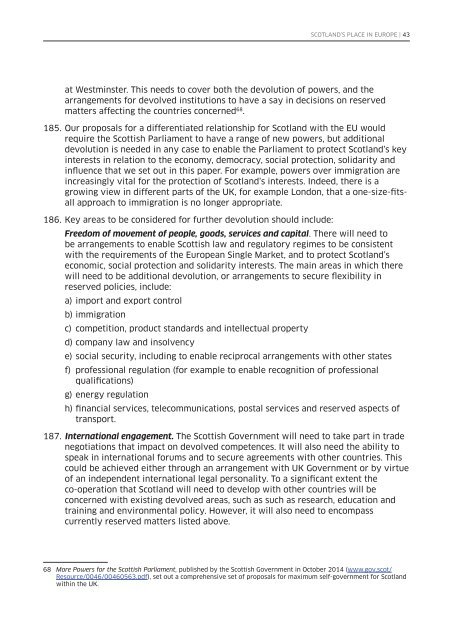Scotland’s Place in Europe
5tSyKxiOE
5tSyKxiOE
Create successful ePaper yourself
Turn your PDF publications into a flip-book with our unique Google optimized e-Paper software.
SCOTLAND’S PLACE IN EUROPE | 43<br />
at Westm<strong>in</strong>ster. This needs to cover both the devolution of powers, and the<br />
arrangements for devolved <strong>in</strong>stitutions to have a say <strong>in</strong> decisions on reserved<br />
matters affect<strong>in</strong>g the countries concerned 68 .<br />
185. Our proposals for a differentiated relationship for Scotland with the EU would<br />
require the Scottish Parliament to have a range of new powers, but additional<br />
devolution is needed <strong>in</strong> any case to enable the Parliament to protect <strong>Scotland’s</strong> key<br />
<strong>in</strong>terests <strong>in</strong> relation to the economy, democracy, social protection, solidarity and<br />
<strong>in</strong>fluence that we set out <strong>in</strong> this paper. For example, powers over immigration are<br />
<strong>in</strong>creas<strong>in</strong>gly vital for the protection of <strong>Scotland’s</strong> <strong>in</strong>terests. Indeed, there is a<br />
grow<strong>in</strong>g view <strong>in</strong> different parts of the UK, for example London, that a one-size-fitsall<br />
approach to immigration is no longer appropriate.<br />
186. Key areas to be considered for further devolution should <strong>in</strong>clude:<br />
Freedom of movement of people, goods, services and capital. There will need to<br />
be arrangements to enable Scottish law and regulatory regimes to be consistent<br />
with the requirements of the <strong>Europe</strong>an S<strong>in</strong>gle Market, and to protect <strong>Scotland’s</strong><br />
economic, social protection and solidarity <strong>in</strong>terests. The ma<strong>in</strong> areas <strong>in</strong> which there<br />
will need to be additional devolution, or arrangements to secure flexibility <strong>in</strong><br />
reserved policies, <strong>in</strong>clude:<br />
a) import and export control<br />
b) immigration<br />
c) competition, product standards and <strong>in</strong>tellectual property<br />
d) company law and <strong>in</strong>solvency<br />
e) social security, <strong>in</strong>clud<strong>in</strong>g to enable reciprocal arrangements with other states<br />
f) professional regulation (for example to enable recognition of professional<br />
qualifications)<br />
g) energy regulation<br />
h) f<strong>in</strong>ancial services, telecommunications, postal services and reserved aspects of<br />
transport.<br />
187. International engagement. The Scottish Government will need to take part <strong>in</strong> trade<br />
negotiations that impact on devolved competences. It will also need the ability to<br />
speak <strong>in</strong> <strong>in</strong>ternational forums and to secure agreements with other countries. This<br />
could be achieved either through an arrangement with UK Government or by virtue<br />
of an <strong>in</strong>dependent <strong>in</strong>ternational legal personality. To a significant extent the<br />
co‐operation that Scotland will need to develop with other countries will be<br />
concerned with exist<strong>in</strong>g devolved areas, such as such as research, education and<br />
tra<strong>in</strong><strong>in</strong>g and environmental policy. However, it will also need to encompass<br />
currently reserved matters listed above.<br />
68 More Powers for the Scottish Parliament, published by the Scottish Government <strong>in</strong> October 2014 (www.gov.scot/<br />
Resource/0046/00460563.pdf), set out a comprehensive set of proposals for maximum self-government for Scotland<br />
with<strong>in</strong> the UK.


